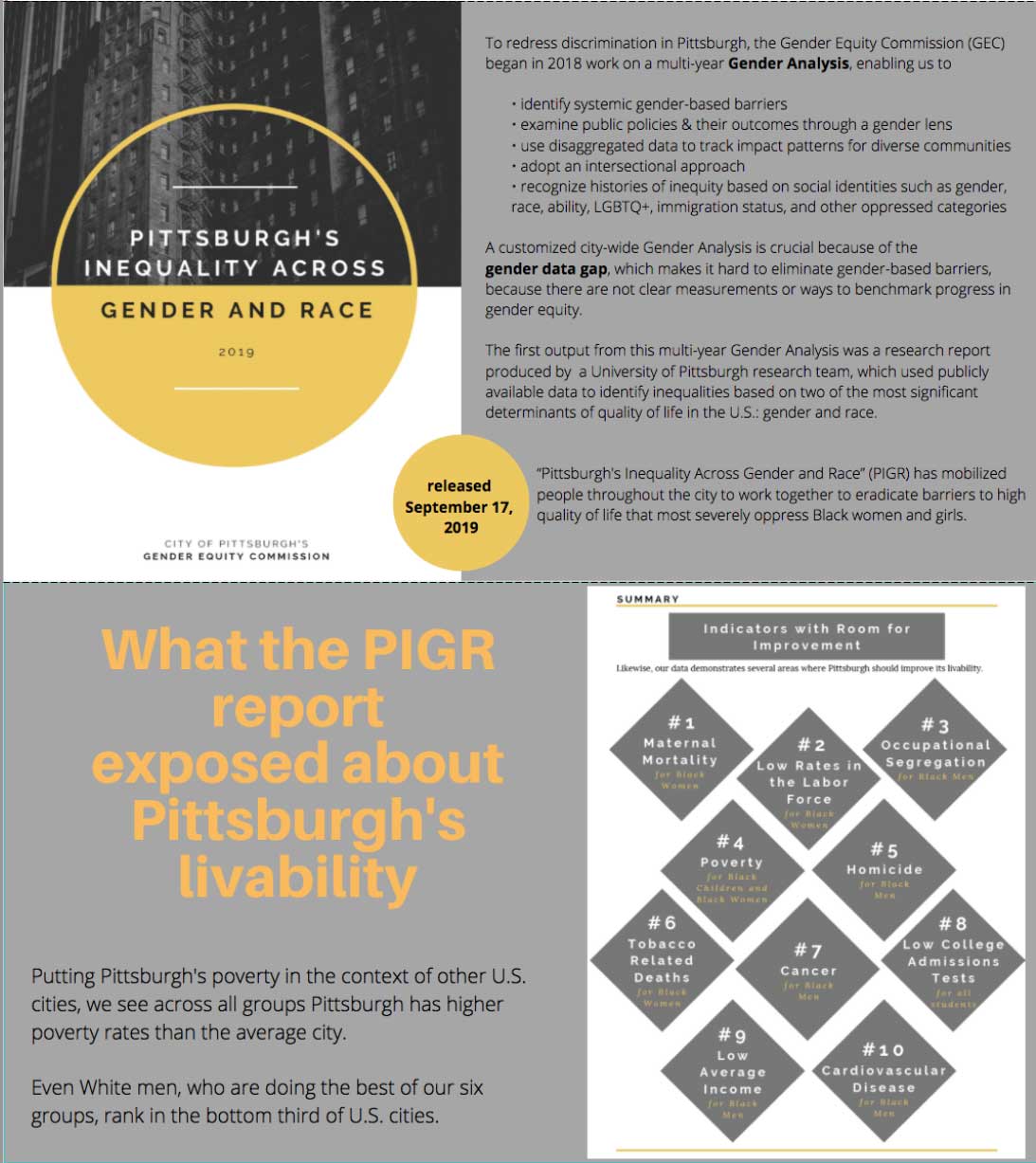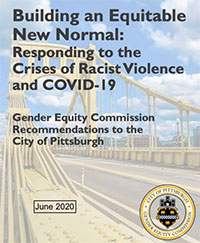Reports and Policy Recommendations
Read the PIGR report(PDF, 7MB). See the following information for background about the GEC's multi-year city-wide gender analyses and policy recommendations.

Post-COVID Policy Priorities
 June 2020: Building an Equitable New Normal: Responding to the Crises of Racist Violence and COVID-19(PDF, 853KB)
June 2020: Building an Equitable New Normal: Responding to the Crises of Racist Violence and COVID-19(PDF, 853KB)
The city must be bold, creative, and committed above all to those most impacted by the dual crises of racist violence and the pandemic. We can’t just “get back to normal,” because that reality was harming far too many people. Our city has an opportunity to create something new. Pittsburgh can lead the way for the nation and the world by continuing to build a city for all.
As a guide to what that should look like, the Gender Equity Commission is pleased to present eleven policy recommendations to Pittsburgh’s City Council and the Office of the Mayor.
August 2020: Mayor Peduto responded to the policy reocmmendations(PDF, 379KB)
PIGR Report
September 2019: Pittsburgh's Inequality Across Gender and Race(PDF, 7MB)
This groundbreaking report exposed severe local inequalities, confirming previous studies finding that Pittsburgh black women and girls especially experience systemic oppression in terms of health, education, poverty, and employment.
The Gender Equity Commission called for this report to analyze disaggregated data about Pittsburgh that will help prioritize policy interventions to make the city truly livable for all.
Multi-Year Gender Analyses
To redress gender discrimination in Pittsburgh, the Gender Equity Commission is among global and national CEDAW municipalities utilizing the methodology of a city-wide "Gender Analysis." Conducting a Gender Analysis means examining public policies and their outcomes through a gender lens. The GEC's multiyear work on a Pittsburgh Gender Analysis reflects a proactive way to address gender-based barriers and to develop best practices for achieving gender equity. The San Francisco Department on the Status of Women describes a gender analysis as:
"a tool to understand gender gaps and create gender equitable policies and programs. By promoting general accountability built on measurable standards, this framework and gender analysis tool constitute an innovative approach to ensuring the human rights of women and girls. Gender analysis focuses on [those differences] which lead to social and economic inequality for women, and applies this understanding to public policy development, service delivery, workforce issues, and budget allocations in an effort to achieve gender parity. . .different strategies may be necessary to achieve equitable outcomes for women and men and among different groups of women."
A city-wide Gender Analysis reveals disaggregated data and impact patterns for different communities. Due to histories of inequity based on social identities such as gender, race, ability, LGBTQ+, immigration status, and others, we cannot assume that existing or proposed policies will be universally beneficial unless we intentionally analyze intersectional structures organizing our city.
A Gender Analysis is crucial because of the "gender data gap," which makes it hard to eliminate gender-based barriers because there are not clear measurements or ways to benchmark progress in gender equity.
Phase 1 (2017-2019)
The GEC solicited proposals for beginning work on a city-wide Gender Analysis through the official procurement system of the City of Pittsburgh. The goal of this RFP was described as: "The Gender Analysis will look at disaggregated data to address intersectional gender discrimination, including identity, expression, sexuality, race and ethnicity, diverse abilities, education, income, and other factors. Based upon the equity disparities identified in the analysis, the GEC will work with the City to create a specific five-year action plan and ongoing plans, then monitor and guide their implementation."
The selected vendor was a research team directed by Dr. Sara Goodkind (University of Pittsburgh School of Social Work) and they used publicly available data about Pittsburgh to identify inequalities based on two of the most significant determinants of quality of life in the U.S.: gender and race.
That research is represented in the report "Pittsburgh's Inequality Across Gender and Race(PDF, 7MB)," introduced at a Mayor's press conference on September 17, 2019.
Based on the recommendations from this first report, the GEC is designing a Workforce Equity Initiative in order to address unacceptable gaps in employment opportunity and rates of poverty impacting women in our city, most dramatically black women and their households.
Phase 2 (2020-)
Based on community responses and gaps in the first report, the GEC issued a second RFP in October 2020, this time focusing on qualitative data and community-based participatory research.
See RFP20000464 for Community-Based Research on Gender Equity in Pittsburgh (deadline: November 25, 2020). Community members-- especially black women in Pittsburgh-- are invited to join the GEC selection committee to select researchers, via this online form.
Additional Information
The GEC thanks community advisors for their continued engagement with our Gender Analysis; read our email communication from June 2020(PDF, 33KB).
Stay tuned for future developments! Contribute your insights and expertise to the Gender Analysis.